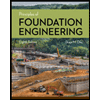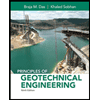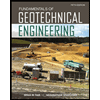A long highway embankment, having the cross-section shown in Figure 2, is to be rapidly constructed at a site. The unit weight of the embankment material is 18.85 kN/m³. The soil profile at the site consists of a 3 m thick layer of coarse sand underlain by an 8 m thick layer of overconsolidated soft silty clay. 2.5 4.0m 4 4.0 m Coarse sand 2.0 m piezometer 2.0 m Soft silty clay 3.0 m 2.5 10.0 m Impermeable layer 3.0 m 8.0 m Figure 2: Cross-section of a long embankment instrumented with three piezometers. From the results of laboratory tests, the saturated unit weight of the coarse sand is 16.5 kN/m³. Based on the results of tests performed on a sample from the mid-depth of the soft silty clay layer, the saturated unit weight of the coarse sand is 17.0 kN/m³, the initial void ratio (eo) is equal to 2.30, the swell/re-compression index (Cr) is equal to 0.055, the compression index (C) is equal to 0.245, and the coefficient of consolidation (c) is 20 m²/yr. Finally, it is estimated that the overconsolidation ratio (OCR) is 2.50. a) Compute the vertical effective stress at the mid-depth of the soft silty clay layer prior to the placement of the embankment. b) Estimate the preconsolidation stress (σp) for a sample from the mid-depth of the soft silty clay layer. c) Compute the increment in vertical total stress (Aσ,) at the mid-depth of the soft silty clay layer along the centerline of the embankment due to its construction. Consult Section 7.8 in the textbook (also see Figure 7.13) or use the equations presented in lecture. d) Compute the ultimate primary consolidation settlement (sc) of the mid-depth of the silty clay layer along the centerline of the embankment. e) What is the time required to reach 50% of the ultimate primary consolidation settlement. f) Compute the amount of primary consolidation settlement after 120 days. g) After one year, what would be the excess pore pressure measured by the three electric piezometers that were installed in the soft silty clay layer?
A long highway embankment, having the cross-section shown in Figure 2, is to be rapidly constructed at a site. The unit weight of the embankment material is 18.85 kN/m³. The soil profile at the site consists of a 3 m thick layer of coarse sand underlain by an 8 m thick layer of overconsolidated soft silty clay. 2.5 4.0m 4 4.0 m Coarse sand 2.0 m piezometer 2.0 m Soft silty clay 3.0 m 2.5 10.0 m Impermeable layer 3.0 m 8.0 m Figure 2: Cross-section of a long embankment instrumented with three piezometers. From the results of laboratory tests, the saturated unit weight of the coarse sand is 16.5 kN/m³. Based on the results of tests performed on a sample from the mid-depth of the soft silty clay layer, the saturated unit weight of the coarse sand is 17.0 kN/m³, the initial void ratio (eo) is equal to 2.30, the swell/re-compression index (Cr) is equal to 0.055, the compression index (C) is equal to 0.245, and the coefficient of consolidation (c) is 20 m²/yr. Finally, it is estimated that the overconsolidation ratio (OCR) is 2.50. a) Compute the vertical effective stress at the mid-depth of the soft silty clay layer prior to the placement of the embankment. b) Estimate the preconsolidation stress (σp) for a sample from the mid-depth of the soft silty clay layer. c) Compute the increment in vertical total stress (Aσ,) at the mid-depth of the soft silty clay layer along the centerline of the embankment due to its construction. Consult Section 7.8 in the textbook (also see Figure 7.13) or use the equations presented in lecture. d) Compute the ultimate primary consolidation settlement (sc) of the mid-depth of the silty clay layer along the centerline of the embankment. e) What is the time required to reach 50% of the ultimate primary consolidation settlement. f) Compute the amount of primary consolidation settlement after 120 days. g) After one year, what would be the excess pore pressure measured by the three electric piezometers that were installed in the soft silty clay layer?
Principles of Foundation Engineering (MindTap Course List)
9th Edition
ISBN:9781337705028
Author:Braja M. Das, Nagaratnam Sivakugan
Publisher:Braja M. Das, Nagaratnam Sivakugan
Chapter2: Geotechnical Properties Of Soil
Section: Chapter Questions
Problem 2.8P
Related questions
Question
100%

Transcribed Image Text:A long highway embankment, having the cross-section shown in Figure 2, is to be rapidly
constructed at a site. The unit weight of the embankment material is 18.85 kN/m³. The
soil profile at the site consists of a 3 m thick layer of coarse sand underlain by an 8 m thick
layer of overconsolidated soft silty clay.
2.5
4.0m 4
4.0 m
Coarse sand
2.0 m
piezometer
2.0 m
Soft silty clay
3.0 m
2.5
10.0 m
Impermeable layer
3.0 m
8.0 m
Figure 2: Cross-section of a long embankment instrumented with three piezometers.
From the results of laboratory tests, the saturated unit weight of the coarse sand is
16.5 kN/m³. Based on the results of tests performed on a sample from the mid-depth of the
soft silty clay layer, the saturated unit weight of the coarse sand is 17.0 kN/m³, the initial
void ratio (eo) is equal to 2.30, the swell/re-compression index (Cr) is equal to 0.055, the
compression index (C) is equal to 0.245, and the coefficient of consolidation (c) is 20 m²/yr.
Finally, it is estimated that the overconsolidation ratio (OCR) is 2.50.
a) Compute the vertical effective stress at the mid-depth of the soft silty clay layer prior to
the placement of the embankment.
b) Estimate the preconsolidation stress (σp) for a sample from the mid-depth of the soft
silty clay layer.

Transcribed Image Text:c) Compute the increment in vertical total stress (Aσ,) at the mid-depth of the soft silty clay
layer along the centerline of the embankment due to its construction. Consult Section 7.8 in
the textbook (also see Figure 7.13) or use the equations presented in lecture.
d) Compute the ultimate primary consolidation settlement (sc) of the mid-depth of the silty
clay layer along the centerline of the embankment.
e) What is the time required to reach 50% of the ultimate primary consolidation settlement.
f) Compute the amount of primary consolidation settlement after 120 days.
g) After one year, what would be the excess pore pressure measured by the three electric
piezometers that were installed in the soft silty clay layer?
Expert Solution
This question has been solved!
Explore an expertly crafted, step-by-step solution for a thorough understanding of key concepts.
Step by step
Solved in 2 steps with 5 images

Recommended textbooks for you

Principles of Foundation Engineering (MindTap Cou…
Civil Engineering
ISBN:
9781337705028
Author:
Braja M. Das, Nagaratnam Sivakugan
Publisher:
Cengage Learning

Principles of Foundation Engineering (MindTap Cou…
Civil Engineering
ISBN:
9781305081550
Author:
Braja M. Das
Publisher:
Cengage Learning

Principles of Geotechnical Engineering (MindTap C…
Civil Engineering
ISBN:
9781305970939
Author:
Braja M. Das, Khaled Sobhan
Publisher:
Cengage Learning

Principles of Foundation Engineering (MindTap Cou…
Civil Engineering
ISBN:
9781337705028
Author:
Braja M. Das, Nagaratnam Sivakugan
Publisher:
Cengage Learning

Principles of Foundation Engineering (MindTap Cou…
Civil Engineering
ISBN:
9781305081550
Author:
Braja M. Das
Publisher:
Cengage Learning

Principles of Geotechnical Engineering (MindTap C…
Civil Engineering
ISBN:
9781305970939
Author:
Braja M. Das, Khaled Sobhan
Publisher:
Cengage Learning

Fundamentals of Geotechnical Engineering (MindTap…
Civil Engineering
ISBN:
9781305635180
Author:
Braja M. Das, Nagaratnam Sivakugan
Publisher:
Cengage Learning